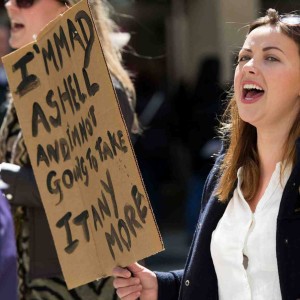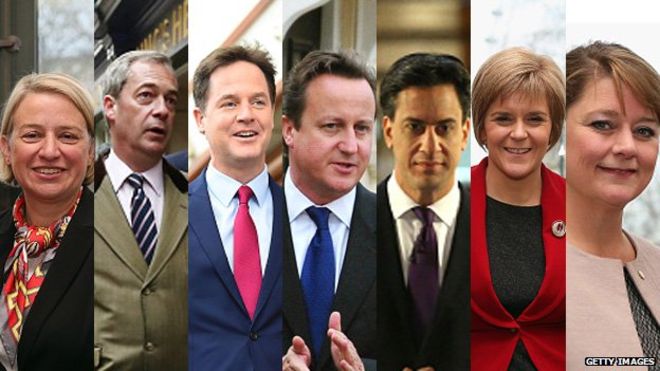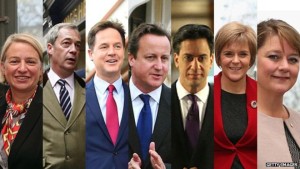This week, of course, we’ve had a General Election. You may have noticed. Like everyone else in the country, I was eagerly anticipating the post-coitus shakedown as the big hitters spent the weekend wooing the minor parties into a coalition. For me, this was going to be a new and fascinating era of UK politics based upon collaboration and mutual benefit.
Then we saw the exit poll. Time stood still.
There is a scene in ‘The Usual Suspects’ where Verbal knowingly utters the line “The greatest trick the Devil ever pulled was convincing the world he didn’t exist“. Well the greatest trick the Tories and their Australian strategist Lynton Crosby pulled was convincing the UK that the Devil did exist. It was called the SNP.
Their machine tooled strategy was to convince the wavering electorate that a vote for Labour would see a coalition with the SNP which could only mean a tartan invasion of London, the likes of which we haven’t seen since Wembley ’77. Naturally, the Tory-led tabloids lapped it up, posturing in a Harry Enfield-esque manner with a “is that what you want, cos that’s what’ll happen” look on their collective faces.
It worked. Brilliantly and brutally. The English vote ran for the Downs, the Quantocks, the Malverns and even the North Yorkshire Moors. Only London escaped, presumably because there are no major hills.
Meanwhile, in the extremely hilly and mountainous constituencies north of the border, the SNP dominated, as predicted, leaving a Labour party stuck geographically and politically with nowhere to turn. Sadly, it was a victory for the politics of fear. The Tories have continually declined to tell you precisely how they intend to make £12bn of cuts because quite frankly their strategy wouldn’t have worked had you known. Their plan was to tell you how terrible the world would look under a Labour/SNP coalition rather than how great it will be under their austere regime.

Welsh artist Charlotte Church spoke out on the eve of the election: “So much of the electioneering that those on the right have done has been based upon fear.” she said “Fear of immigration, fear of economic instability, fear of welfare claimants and the unemployed. The politics of fear is the politics of control. If we allow ourselves to be scared of the bogeyman we will find ourselves isolated internationally, without a welfare system, and with an even more pronounced poverty gap than we already have. If the economic definitions of Left and Right are that the Left want to increase taxes and spend on public services, and the Right want to lower taxes and reduce spending on public services, then never has it been more glaringly obvious that the Rightwing getting their own way. Multi-national companies are paying less tax than ever before, whilst the NHS has already been carved up and is primed to be sold off. The trickle-down economics that we have unwillingly propped up since the 60s is so far from functioning as to make it farcical.”
Don’t get me wrong, I am no apologist for the Labour Party these days. Had their strategy of sitting on their hands and saying nothing of note whilst waiting to form a coalition come to pass, well we would still be sat here talking about cuts to public services and welfare. Not as harsh maybe but it would still have happened.
I have friends who voted Tory and unashamedly so too. I don’t hate them because of it, quite the opposite, I love my friends and this is because they are good, decent people with whom I share plenty in common. They have always been Tories and I respect their views and their ability to form opinions based on their own map of the world and not one imposed on them by the media.
However, the next five years are going to test the patience of us all. We can all play at being Polly Toynbee and list the endless reasons why we’re going to hell in a handcart but let’s take a step back and be realistic. Tax breaks for the rich will continue and corporations will be allowed to exploit legal loopholes in order to evade their tax bills. As for the banking industry…that’s a debate all on its own.
The rest of us will continue to be penalised for a problem we never created. I accept it’s very simple for those of us who sit in relative middle class comfort to pour scornful indignation onto those who voted for this catastrophe but to be honest our pain is just a pin prick compared to anyone who is genuinely vulnerable and likely to be the hardest hit.
Like it or not, the country has democratically voted to accept austerity and, once we leave the EU, to have our Human Rights removed. This is not conjecture, this is fact. Irrespective of your political persuasion, you can no longer ignore the fact that there is to be an ever-burgeoning number of people in society who will not be able to cope. So what are we going to do about it?
So here’s my point. Stop moaning and help. Some of you will already know I had serious thoughts about standing in this election and the result has given me further ammunition to do so. But we don’t have to make such grandiose gestures to make a difference. We could, no scrub that, we all should do something, however small, to make a positive difference to society.
Do some charitable work, help out a neighbour, join your local parish council, buy a stranger a cup of coffee, create a community scheme to tidy up your street, buy a wristband to help save the whales…just something, for Chrissakes. I am sick to the teeth of people complaining. A better, fairer and more compassionate world isn’t just jargon on a leaflet pushed through your door, it should be something we all collectively and individually sign up to do. The world around us could be dismantled over the next five years, let’s ensure we push back and make of it what we can.





